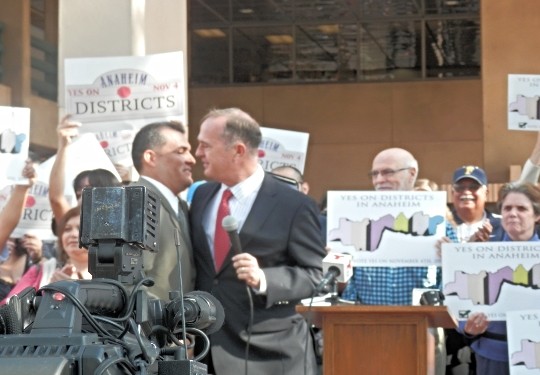
A settlement on an ACLU lawsuit alleging Anaheim's at-large system violates the California Voting Rights Act was announced during this week's city council meeting, ensuring that single-member districts will be on the ballot this November. Celebrants took to the steps of city hall yesterday for a press conference.
Jose F. Moreno, lead plaintiff in the suit, Anaheim City School District trustee, OC Scariest People inductee for 2012, and a rumored city council candidate this year, anchored the lineup of speakers. As he gave his opening comments, an Anaheim police ghetto bird noisily hovered above, which saved people from Moreno's usual droning academic gobbledygook.
Mayor Tom Tait, a district elections convert, spoke afterwards, and somehow the gabacho Republican received the most sí, se puede! chants of the day.
]
If voters approve single-member districts, Anacrime will be the only major city in OC to have them. The next closest and comparable spot is Long Beach which has employed the electoral system for awhile and is similar to Anaheim in a lot of ways: diverse neighborhoods that veer from wealth to poverty, a local economy dependent on tourism, and dirty cops galore.
Back when Anaheim burned during the summer of 2012, LBC's social justice organizations like the Long Beach Area Peace Network offered solidarity. “We are outraged by the police shootings in Anaheim, and the recent deaths of Manuel Diaz and Joel Acevedo,” read a letter the group issued in September 2012 signed by Naida Tushnet and Marshall Blesofsky. “We also noted the district elections were rejected by your city council,” it further stated, referencing Kabuki theater the month before at Cook Auditorium in Anaheim High School. “In Long Beach, we fought for and won district elections over 30 years ago. While district elections may not be an answer to police violence, they do make the system little more responsive to the people.”
(The Long Beach Police Department sure as hell proved the former point tallying 20 officer-involved shootings last year.)
Well before Anaheim got the Dickens treatment from parachute journalists and academics, Long Beach held the “Tale of Two Cities” narrative. A searing study by that title prepped by the Los Angeles Alliance for a New Economy (LAANE) in 2009 contrasted the subsidized downtown tourist/convention economy with staggering poverty. Hotel workers were paid 13.6% less than their Anaheim counterparts. Most tragically, concentrated child poverty rates ran high. The boom of hotel bed tax revenue largely didn't benefit the people. Sound familiar?
Long Beach's single-member districts at the time not only did nothing to ameliorate the problem; it exacerbated it by producing black and brown faces in high places that kept quiet once in power. The big business community scoffed at the electoral method as they got what they wanted, with their press pals bemoaning low voter turnouts and other whiny complaints.
[

“We can learn from Long Beach's experience,” says Gary Hytrek, co-founder of Long Beach Coalition for Good Jobs and a Healthy Community, “but we have to pay close attention to the dynamics of the city being looked at.” That being said, the Cal State Long Beach sociology professor offered his thoughts. “I don't know a great deal about Anaheim, but I think district elections is an important step to give folks a voice.”
It can create a structural shell, but Hytrek puts a heavier emphasis on grassroots organizing to grow into it and deliver on the political reform's promises. “Elected officials actually set policy, but unless the community is organized, that voice is not going to be heard.”
The Coalition scored a victory in November 2012 with Measure N, an ordinance that overwhelmingly passed, giving non-unionized workers at sizable hotels in the city a minimum wage of $13 an hour. “Only in having growth with equity can you really have a sustainable economy,” Hytrek says, noting that big business is still very much a power presence.
Anaheim is lean on homegrown grassroots groups with teeth, but before looking to change under district election reform, advocates have an election to win. And that means broadening an electorate beyond the reactionary one that produced the current council that fought, delayed and dragged the issue until this week's settlement. Just remember, cabrones: elections by district don't mean a damn thing if it's a roll call of vendidos.
Follow Gabriel San Román on Twitter @dpalabraz
Follow OC Weekly on Twitter@ocweekly or on Facebook!

Gabriel San Román is from Anacrime. He’s a journalist, subversive historian and the tallest Mexican in OC. He also once stood falsely accused of writing articles on Turkish politics in exchange for free food from DönerG’s!

